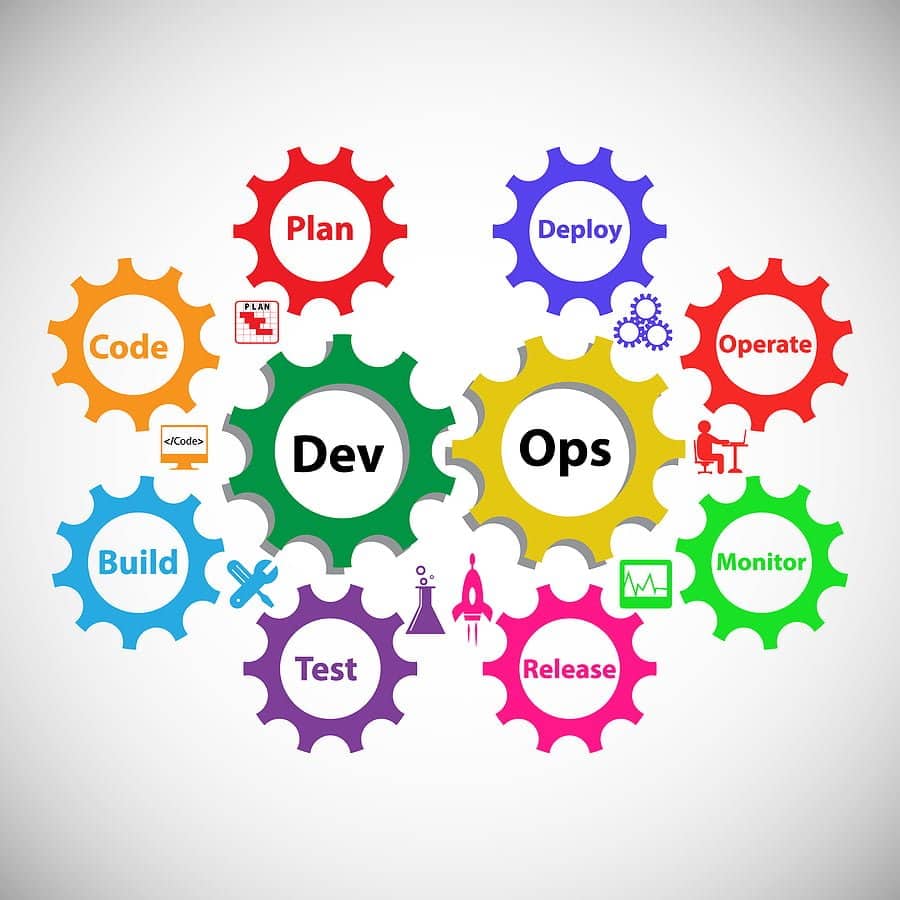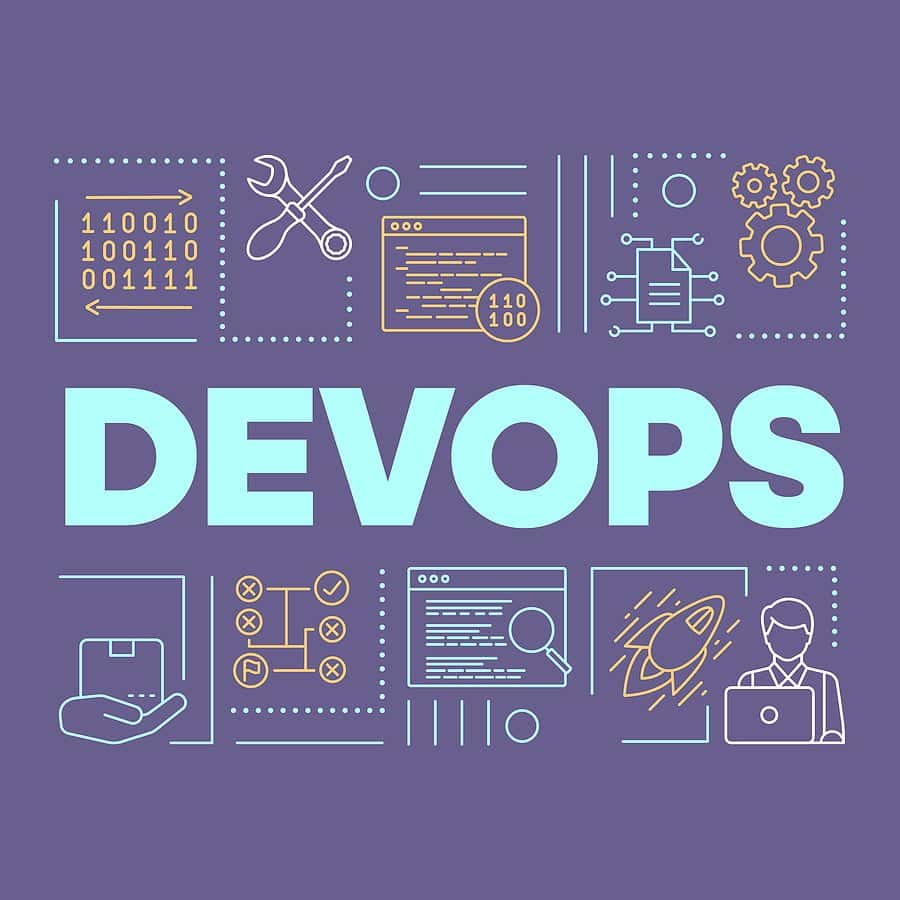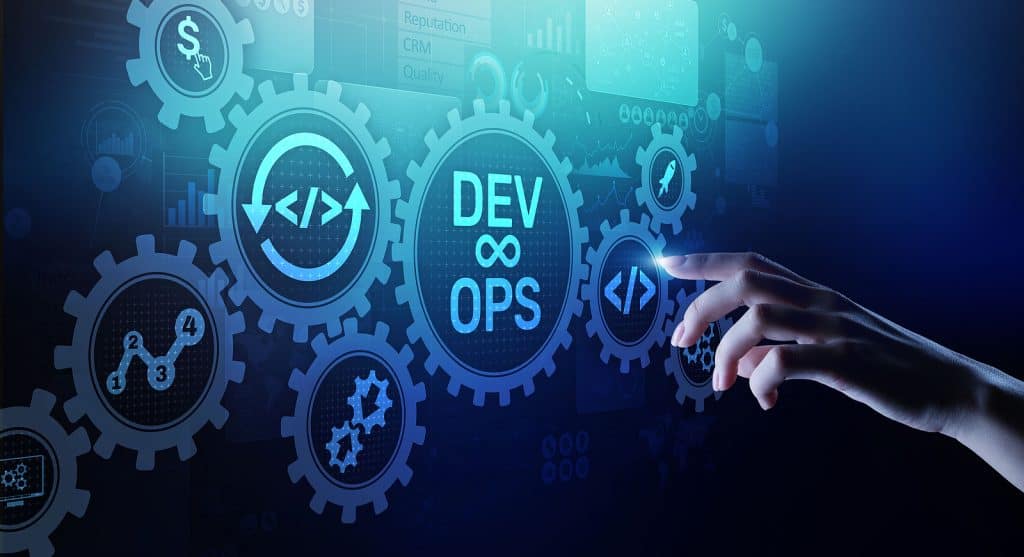What is Meant by DevOps?
The term DevOps is simply dev from development + ops from operations. So it is about combining the development of an application or service with the operations tasks of supporting it. The value of doing that mostly comes from breaking down traditional silos within IT, having a single responsibility for the whole life of the service reduces internal conflict and maximizes collaboration via shared goals and metrics. DevOps encourages the fast flow of work through multiple frequent releases, early and wide-ranging feedback on changes and automation wherever practical.
Table of Contents
ToggleThrough collaboration and empowerment of teams who own an application, it delivers speed and cost savings, by encouraging frequent targeted releases, and cost savings from early detection of errors and reducing work that does not directly deliver benefit.
What are DevOps Examples?
It means different things to different people and to different organizations. But some things are common enough to see them as examples of what DevOps is and what it can do. Things you’d expect to see in the majority of IT teams that call themselves DevOps:
- Continual Integration of Code into a master repository at least daily. This relies on automated testing of code and ensures errors are found early.
- Monitoring and acting upon the results of monitoring – this delivers measurements that reflect improvements in performance.
- Collaboration. The real value driver from DevOps is by having a team with wide responsibility (for the application or service) delivering to shared goals: judge the team, not the individual.
Does DevOps Need Coding?
Yes. Usually. Applications deliver what the code tells them to. Without the code, there is no application. Without writing and rewriting that code the application won’t change to reflect changing requirements. Maybe something might be delivered by bought-in software, but even then, it’s a thin line between configuring software and coding.
For most organizations, DevOps team members (maybe called DevOps engineers?) will be writing code in Linux, Python, on AWS, or something.

The point is that coding is one part of DevOps. Because of DevOps attitudes, collaboration, and sharing and team goals, it is clear to those doing the coding that coding is most certainly not all you need. ‘Coding in a lifecycle context’ might be a good motto.
What is DevOps Salary?
Salary is the money they pay you each month for working on a DevOps team. And it is one (just one) of the benefits that come to those working in a DevOps team. The average salary for a DevOps engineer in the US is around $100,000 annually. Of course, that varies across the US and even more across the world. And where teams have different roles, others may pay less. In a rapidly changing world, predicting likely salaries is too hard to be sensible. But recent history shows us that salaries for IT professionals working in a DevOps environment are likely to be a bit higher than those paid by more traditionally structured organizations. People pay for innovators, and DevOps needs innovators.
Is DevOps Hard?
Yes, no, it depends. It is no harder and no easier than any other new way of working. Most people find change difficult – even when you want to change, there are behavior patterns, attitudes, and routines to alter – and that all takes time and some conscious effort. So, moving into a DevOps environment will feel different, and that can be hard. If you are used to working alone or being judged individually rather than as a team, and especially if you’ve been seeing your colleagues as competitors for advancement, then DevOps will require adjustment. But the effort will be worth it, get it right, and you have a supportive environment at work that reduces stress and worry, and that makes life easier for most people.
Is DevOps Easy to Learn?
DevOps is easy to learn, but not always quick to master because it needs attitude and behavior changes. You can learn the terminology – the three ways, agile manifesto and so on, and you can get the hang of the technical practices – continual integration, delivery, release and deployment, monitoring, and configuration management tools. That all helps and for those fresh from college and used to picking up new ideas, it should be a stroll.
Getting the cultural change is harder, and for many, it needs that ‘aha moment’ when the light goes on, and you ‘get it.’ There may be a feeling of discomfort and of not fitting in before that happens, but it usually just takes patience and trusting others.

Is DevOps a Good Career?
No. DevOps is a way of working, a cultural approach supported by technical elements, automation, and appropriate frameworks. There are two logical approaches to seeing a career – it’s either in a broad area of work: I want to work with animals, be a civil engineer, be a farmer. Or it’s working for an organization: he worked 20 years for the government, he had a career in IBM. DevOps doesn’t fit in with either of those ideas; it’s an approach to doing the job of IT build, delivery, and support. See the career as being in IT and DevOps helping you with it – like how a car helps you be a driver.
Is coding knowledge required?
DevOps teams usually require coding knowledge. That doesn’t mean coding knowledge is a necessity for every member of the team. So it isn’t essential to work in a DevOps environment. It’s like asking, ‘is it essential to be right-footed to be in a soccer team?’. Of course, it isn’t, even though most of the team will be. The strength of a team is in its collaborative use of its variety of skills – true for football (all kinds) and DevOps, and every other kind of team too.
What is required is an appreciation of what skills are needed and how they fit in. So, you don’t have to be able to code; you do need to know what coding is, how it fits in, and why it matters.
Does DevOps pay well?
DevOps pays quite well right now, but that isn’t the real point. It’s a really useful and powerful way of working, a product of the 21st Century and so quite fashionable. IT has always been a fashion-conscious industry, and those with fashionable skills are usually well paid. DevOps obvious benefits adopting companies and success will probably make it mainstream soon. Then it’ll be the norm and so – by definition – will be the salary paid for that norm.
It can help people future-proof themselves a bit by being skilled and experienced in the growing ways of working.
Where Can I Learn DevOps?
DevOps has a very broad body of knowledge; since there isn’t a single definition, then a wide variety of interpretations are possible concerning the scope and content of DevOps knowledge. A simple search across the internet with questions like ‘what is DevOps’ will give a good start. And it will illustrate that wide range.
Taking it deeper is easy enough too. All the usual mechanisms for learning are there for DevOps:
- Read about it: DevOps for Dummies, the Phoenix project novel (a great intro to the culture), and lots of well-intentioned books.
- Training courses – all the major IT training companies offer one or more of the flavors of DevOps training. From half-day awareness through to certification-based training.
- Forums, chat rooms, portals, conferences – there is much to learn from your peers and those who have traveled the DevOps road before. Notable is the DevOps Enterprise Summit (DOES) events.
Can I Learn DevOps Online?
Yes, it is probably the best way at the moment. All the major training companies offer online training. Just search on the web, and you will be offered plenty of choices. As with all training, start to narrow the field by thinking about what, when, and how you want to learn. And of course, the cost
Some online training is self-paced, mostly based on reading slides and documents. Some are pre-recorded videos that are like listening to a classroom training course. And some is through a virtual classroom, where you listen live and can interrupt, seek clarification, ask questions, etc.
The prices and availability vary – as do the languages, of course. You can get DevOps training in many languages as well as English.
How do I Start From Scratch?
DevOps is a way of delivering and supporting IT applications and services. Every organization is doing that already. Adopting DevOps ideas is changing some of the approaches, techniques, and attitudes by which they do it. It’s important to see the adoption of DevOps as a way of doing better at something you already do. It is not some new magic answer or about achieving something totally different from what has been done before.
Starting DevOps is usually best done by adopting a pilot in one part of the organization. Perhaps for one (or a few) applications, often with a mix of existing staff (who know the organization and are interested in learning new ways) and new staff with DevOps experience. A key tool is patience. DevOps is about changing people’s behavior; it is never instant. Big bang does not work with DevOps.
What is DevOps beginner?
Individuals start at DevOps by discovering what it is—learning about its nature and its essentials. And they develop by believing in the ideas and benefits apparent. It isn’t necessary to learn everything to start making a difference.
Organizations often start at DevOps by picking one service or application to try the new ideas out on. Set team metrics for that group and then monitor and report on it. One obvious beginning is in the word: DevOps. Get development and operations people talking with each other, share metrics. Judge development by how easy/hard it is to support an application or service. Judge operations by how they get the benefits and innovations to the users.
What is DevOps AWS?
AWS – Amazon Web Services – is a cloud computing service provider. One of the biggest and most successful, delivering full function software as a service platform. It runs things for you, so you don’t have to, and so takes care of much of the IT tasks that organizations used to have to do, letting you can get on with building what you need.
Cloud and DevOps are both 21st-century products, and so it is no surprise that they evolved together and work well together. And so AWS provides services designed to help their customers use and benefit from DevOps approaches. Those services simplify key DevOps elements such as managing infrastructure, deploying code, automating release, and monitoring application and infrastructure.
Is DevOps Only for Cloud?
DevOps and Cloud have evolved together in the 21st Century, so – of course – they work well in combination. Cloud particularly has become so pervasive that it is increasingly difficult to find an organization not doing at least some of their IT on a cloud. But Cloud and DevOps are not inseparable. It is perfectly possible to run a project through a traditional waterfall approach and then run it on a cloud platform. It’s equally possible to apply full-on DevOps to building, releasing, and supporting applications to run on IT hardware within your organization.
But thinking about just one of those things at a time isn’t recommended. Because organizations should consider all the relevant options for their services – not just DevOps and Cloud, but whatever is potentially relevant.

Is AWS a DevOps Tool?
AWS is a cloud platform delivering software as a service solution for its customers. It supports DevOps working methods. Specifically, it does this by providing customers with a range of DevOps supporting tolls within the AWS offering. These support fundamental DevOps supportive concepts such as continual integration, delivery, etc., monitoring, configuration, automated release, and more. So strictly, AWS is not a DevOps tool, but using AWS is likely to involve using DevOps tools within that platform.
What are Good Tools?
DevOps is more than automation but most certainly requires significant automation to be successful. So, DevOps tools are a vital part of any DevOps initiative. The areas addressed by a DevOps tool include categories like:
- Source code management: helping multiple coders work together in concert and not discord.
- Continuous integration and continuous delivery: integration of code daily into single master and automated testing to ensure code is always deliverable.
- Containers: allowing code to be isolated and transportable while delivering consistent functionality.
- Configuration management: knowledge of, and management over, software elements.
- Monitoring: automated measurement of multiple aspects of an application, and reporting on those measurements, maybe also automated reactions too.
- Security management: keeping secrets secret, preventing intrusions, etc.

How Difficult is AWS DevOps Certification?
It is a difficult exam, requiring a deep knowledge of the AWS platform and tools. It is fully focused on the AWS platform, but for those passing it, it is generally considered to have been time, money – and pain – well spent. For those working in the AWS DevOps environment, it is certainly an asset and should be within the scope of an experienced engineer.
What is the Best Certification?
There are many certifications out there with the word ‘DevOps’ in them. Some examples;
Introductory/Foundation certification in DevOps: different flavors exist from different companies; each will give a grounding in what DevOps is, what it isn’t, and some terms, techniques, and frameworks commonly used to make DevOps work. DevOps Institute (DOI), DevOps Agile Skills Association (DASA) and BCS: the Chartered Institute for IT, all offer their approaches, with certification following a relatively simple exam. Of these, DOI is the most general, BCS, the most technical.
Higher level, more focused certifications also exist – DOI, for example, offer DevOps Leader, DevOps Test Engineer, and more. DASA offers courses at Foundation, Professional and Leadership levels.
Additionally, there is a whole raft of certifications assessing skills at specific tools and platforms such as AWS, Azure, Docker, Puppet, and many many more.
How to Become a DevOps Engineer?
The route to becoming a DevOps engineer will look different, depending on where you are starting from.
If you are an experienced software engineer that wants to move into a DevOps environment (because it’s the future, looks like it pays better, seems more interesting/challenging) you need to show you have relevant coding skills, ability to work in a collaborative environment and an understanding of the whole lifecycle of an application – not just how to code it. If you have the coding skills, can show you are a team player, show basic DevOps awareness (foundation certificate from one of the certification bodies perhaps) then apply for jobs. You likely won’t get the first one, but gather experience and keep trying.
If you are coming from a non-technical background, then it’s harder – but still perfectly possible to get into a DevOps environment and then pick up some technical understand and even technical skills.
If you are coming from a ways off – lion taming, accountancy, don’t bother. Seriously, it’s an IT role, and good IT professionals can aspire to it.
How do you Get into DevOps?
How do you get into any area of work? You get and demonstrate the skills needed. DevOps is about a silo free and collaborative approach to designing, building, testing, delivering, supporting, and improving IT applications and IT services. Because it is a collaborative approach, it needs a range of skills, so there should be a route in for anyone keen and interested in it.

What Skills do you Need?
If your company is bringing in DevOps, then show interest and ask for relevant training. There are technical skills involved, but not everyone has to have every skill.
If your company doesn’t do DevOps, then you need to persuade them or move. Start by getting certification in DevOps – Foundation certificate will show you are motivated to be involved in the DevOps world.
If you are a highly technical, IT graduate, software engineer, it can really help to show your familiarity with key programming languages like Python and Linux.
What are DevOps skills?
DevOps is about collaboration within a team working in an environment that has broken down silos between IT areas and the business and intends to prevent those silos being rebuilt, or new ones developing. A good DevOps team will have a range of skills. There will be a need for technical and coding, along with good testing skills, business relationships, and operational skills too. All those skills need to be represented in the DevOps teams – or a means of access to them established (such as external operations teams).
What everyone in the team needs is:
- Understanding the range of skills needed, who has them, and how to coordinate the best use of the skills.
- Team attitudes – realization that they work as a team, and will be judged on team performance above individual efforts.
- Collaboration and human skills.
What is the Best Programming Language?
DevOps doesn’t depend on which programming language you use – it depends on changing organizational – and human – behavior and culture. It should – indeed, does – work independently of what languages are being used. Many companies have adopted DevOps approaches to the improvement and maintenance of legacy systems written in older programming languages. It isn’t confined to brand new applications.
That said, empirically, it would seem that most DevOps engineers are working in Linux, Python, and the like. Modern integrated DevOps/cloud solutions based on a major suppliers range of products seem to be increasing in popularity and take up: such as AWS and Microsoft’s Azure
Is DevOps Technical?
It shouldn’t be, but in many organizations, it is. DevOps isn’t just about automation, but it does rely on automation and will not work without it. So, given the need for reliable automated software products, there is a need for technical knowledge and skills to get the best value form those products.
And DevOps is an IT approach – about creating and supporting applications to help the business. That inevitably means creating IT code – or at least ensuring code runs and delivers the benefits. Again, that brings with it some degree of technical dependency and so a need for technical knowledge. Once you build an engine, you need an engineer.
DevOps is likely to have a technical aspect, but it is important to see these as means to an and (and end of better, faster, cheaper applications) and not the reason for doing it.
What are Popular Tools?
What tools should I buy is a very common question, but an impossible one to answer easily for a range of reasons:
- The tool landscape is forever changing – what is true today will likely not be tomorrow.
- Different tools suit different situations, and everyone is – to some degree – in a unique situation. And that means there is no single right answer.
- Fashion, preference, and personal considerations affect which is the best tool for any situation. Just as one example, the best tool for a particular requirement might be the wrong one to buy if it turns out not to support one of the languages your company works in.
But there are countless lists of ‘top tools for DevOps’ available – and you can see the usual suspects frequently appearing, such as:
- Docker
- Puppet
- Jenkins
- git
- Kubernetes
- Raygun
- Gradle
- Ansible
- Azure
We could run out of space, but you get the idea.






